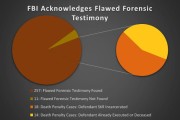Texas Criminal Legislative Update: May 6, 2015
Now that May is here, our Legislators are running out of time to move their bills through committee, pass them out of their Chamber, then repeat the process in the other Chamber. Thus, many bills will begin to fall by the wayside as the Legislators focus on their top priorities. We have put together some information on legislation we’re monitoring that still has a chance at becoming law.
- HB225 by Representative Guillen (which we previously reported on here) received a new wave of support following an impressive report that Texas has been dramatically and systematically under-counting prescription overdose deaths. The problem with the Department of State Health Services reporting methods is they focus on certain painkillers, rather than all prescription drugs. For example, the DSHS commissioner cited 622 opioid-overdose deaths statewide in 2013; in actuality there were 798 prescription-drug related deaths recorded by medical examiners in just 17 of Texas’ 254 counties. And “in Tarrant County, which includes Fort Worth, the medical examiner’s office recorded 44 deaths in 2013 involving specific prescription drugs and another 57 fatalities from “mixed drugs.” The State’s count was 24 opioid overdoses.” The House bill has passed the full House and the Senate Committee on Criminal Justice, and has been proposed for the Senate local and uncontested calendar.
- HB1546 by Representative Alma Allen (sponsored by Senator Rodriguez) will potentially save the State a quarter of a billion dollars over five years by allowing State Jail Felons to shave off up to 20% of their day-for-day incarceration time by participating in educational and treatment programs designed to curb recidivism.
- HB2263 by Representative Hughes would require the government to obtain a warrant if they wished to access a private citizen’s cell phone location information. This bill has ample support (four authors and 93 coauthors), except where it needs it most: House Criminal Jurisprudence Committee Chairman Abel Herrero delayed the bill from receiving a hearing and then inexplicably voted against it.
- SB487 by Senator Ellis expands access for convicted felons to post-conviction DNA testing “in situations where the judge believes there is a ‘reasonable likelihood’ that credible exculpatory biological evidence exists…” Currently, those seeking DNA testing must prove “biological evidence exists before a judge can allow testing to see if exculpatory biological evidence exists.” (Author’s/Sponsor’s Statement of Intent)
- SB578 by Senator Hinojosa requires TDCJ “to identify organizations that provide reentry and reintegration resource guides and to collaborate with those organizations to prepare a resource guide” and give it to inmates preparing to leave TDCJ. The purpose is to place accurate and helpful information in the inmates hands before they’re released without a safety net or support system. (Author’s/Sponsor’s Statement of Intent)
- Sadly, it doesn’t look like many (if any at all) of the myriad asset forfeiture bills (many of which we have previously covered) will make their way out of their respective committees. HB530 by Representative Hernandez will be heard on the House floor on Friday, and would use the proceeds to create college scholarships for children of peace officers killed in the line of duty; also requires more transparent reporting, which could create an avenue for other germane forfeiture-related legislation to be folded into this bill before the final House floor vote. Grits for Breakfast blog has some good coverage on law enforcement opposition to these seemingly-benign bills.


